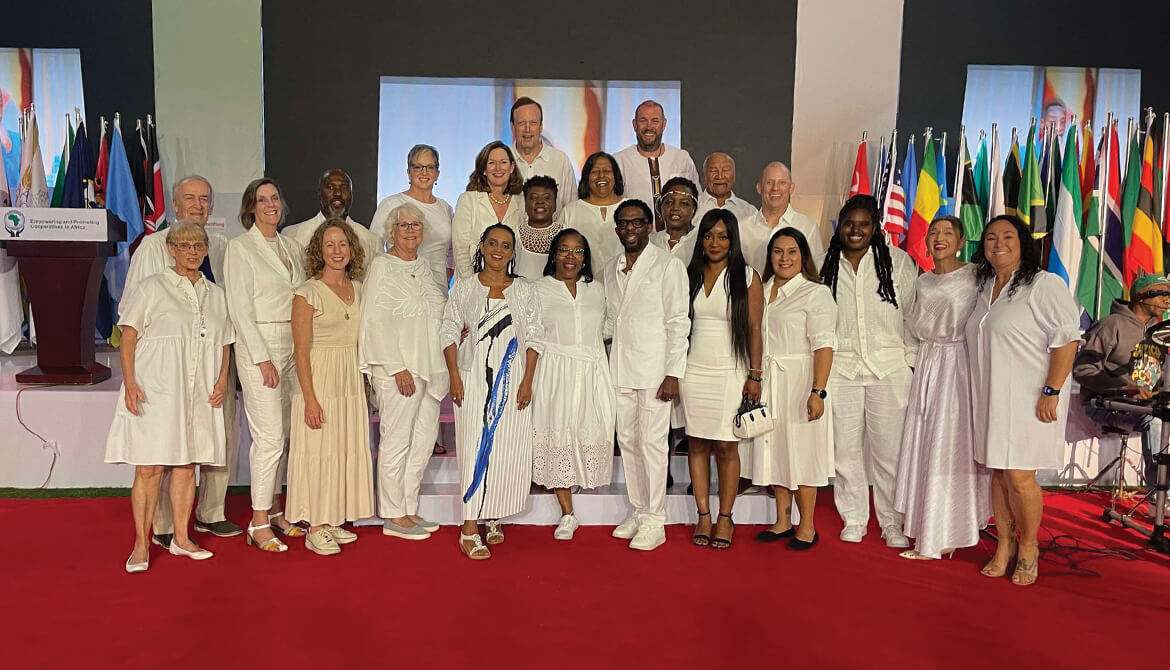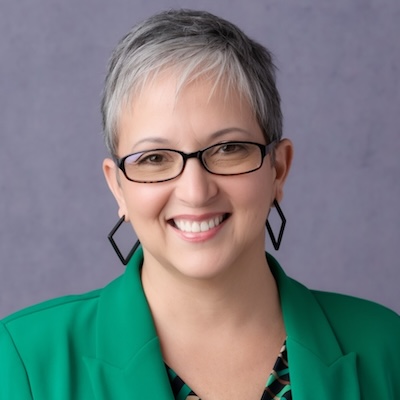4 minutes
Discover how the I-CUDE program transforms lives and empowers leaders to grow, connect, and champion financial inclusion and education on a global level.
As we recognize International Credit Union Day—a time to celebrate the global impact of the credit union movement—I find myself reflecting on the transformative journey I've had through the International Credit Union Development Educator (I-CUDE) program, offered through the Worldwide Foundation for Credit Unions and the World Council of Credit Unions (WOCCU).
From my early days working in academia to my time in public service and non-profit healthcare, I've always been drawn to work that's about something bigger than myself. But it wasn't until I entered the world of credit unions that I truly found my calling, and the I-CUDE program has been the catalyst for profound personal and professional growth.
The I-CUDE program, an extension of the Credit Union Development Education (DE) program, has been transformative in ways I never imagined. It's not just about understanding credit unions; it's about experiencing firsthand the power of the "people helping people" philosophy, which drives our movement globally and sits at the heart of International Credit Union Day. This experience has honed my skills as a collaborative, service-focused leader, teaching me the value of patience, perspective-taking, and adaptability in diverse cultural contexts.
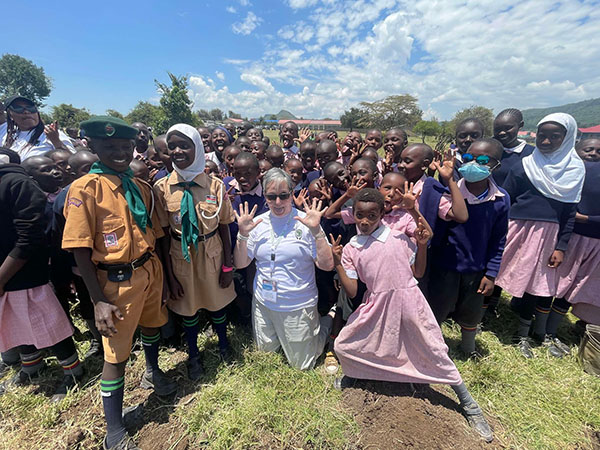
My journey with I-CUDE has taken me across continents—most notably and most recently to Africa, where over the course of four different visits I have volunteered for ACCOSCA (the Pan-African Trade Association for Credit Unions), as facilitator, workshop leader, mentor, and participant in a variety of capacities, including completing the Advanced Africa Development Educator program (AADE). These experiences have been eye-opening, challenging me to view the world through different lenses and appreciate that things don't always function as they do in the U.S.—nor should they. In an upcoming post, I’ll share my experience at the recent SACCA Congress—a powerful gathering of credit union professionals from more than 42 different nations—demonstrating the tremendous business impact financial cooperatives are making worldwide.
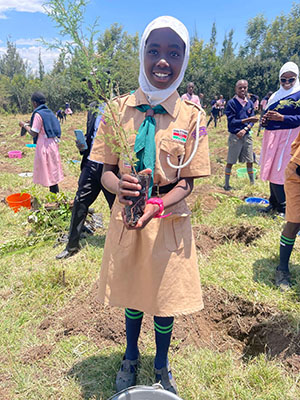 In Africa, I’ve witnessed how credit unions—or SACCOs (Savings and Credit Cooperatives) as they're known—are solving real problems for their members and making significant community impacts. For example, in a coastal village in Kenya, I supported a project where a local SACCO provided microloans to women entrepreneurs, enabling them to start small businesses knitting and repairing fishing nets to support their families. In another inspiring instance, the Kenya Police SACCO sponsored the construction of a dining hall and recreation center for the Utumishi primary school. The experience that stands out the most, however, was from our visit to that primary school to plant trees as part of our collective commitment to climate action. We were greeted with wild enthusiasm by students, including a 12-year-old Kenya Scout named Marion. Marion guided me through the process of planting trees together, and afterwards we had great fun with her friends posing for the camera and telling stories. Before I left, I asked Marion what she learns in the Kenya Scouts. She said, “We learn how to make investments.” This answer surprised me in a variety of ways. When I asked her to explain more, she said, “You plant the trees as an investment in the future. When you save your money, that is also an investment in the future.” I was blown away by this. The SACCO there is clearly taking its mission of financial inclusion and education seriously, and this one girl’s unsolicited testimony to the importance of savings was moving and inspiring.
In Africa, I’ve witnessed how credit unions—or SACCOs (Savings and Credit Cooperatives) as they're known—are solving real problems for their members and making significant community impacts. For example, in a coastal village in Kenya, I supported a project where a local SACCO provided microloans to women entrepreneurs, enabling them to start small businesses knitting and repairing fishing nets to support their families. In another inspiring instance, the Kenya Police SACCO sponsored the construction of a dining hall and recreation center for the Utumishi primary school. The experience that stands out the most, however, was from our visit to that primary school to plant trees as part of our collective commitment to climate action. We were greeted with wild enthusiasm by students, including a 12-year-old Kenya Scout named Marion. Marion guided me through the process of planting trees together, and afterwards we had great fun with her friends posing for the camera and telling stories. Before I left, I asked Marion what she learns in the Kenya Scouts. She said, “We learn how to make investments.” This answer surprised me in a variety of ways. When I asked her to explain more, she said, “You plant the trees as an investment in the future. When you save your money, that is also an investment in the future.” I was blown away by this. The SACCO there is clearly taking its mission of financial inclusion and education seriously, and this one girl’s unsolicited testimony to the importance of savings was moving and inspiring.
My international experiences have taught me valuable lessons in resilience, community-driven solutions, and the ripple effects of strategic investments in education and sustainability. They have also cultivated my ability to navigate cultural differences, manage expectations in resource-constrained environments, and find creative solutions to complex challenges. These skills have proven invaluable not just internationally, but also in my day-to-day leadership back home, where I strive to approach problems with a broader perspective and greater empathy.
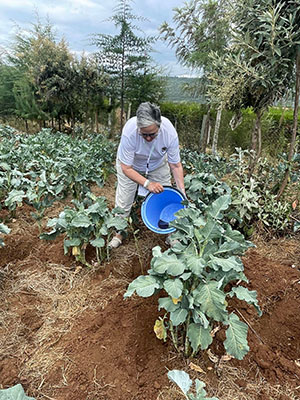 To those considering the DE or I-CUDE program, I can't recommend it highly enough. It's more than professional development; it's a journey that will challenge your perspectives, broaden your horizons, and connect you with a global community of like-minded individuals dedicated to making a difference. It will push you out of your comfort zone, teaching you to embrace uncertainty and find strength in diversity.
To those considering the DE or I-CUDE program, I can't recommend it highly enough. It's more than professional development; it's a journey that will challenge your perspectives, broaden your horizons, and connect you with a global community of like-minded individuals dedicated to making a difference. It will push you out of your comfort zone, teaching you to embrace uncertainty and find strength in diversity.
As I look to the future, I'm inspired by the potential of our international credit union movement. The skills and insights gained through the I-CUDE program have equipped me to be a more effective advocate for financial inclusion and cooperative principles. Together, we're not just building stronger financial institutions; we're fostering a more equitable and sustainable world. And that, to me, is the true power of people helping people—a philosophy that the I-CUDE experience has embedded deeply in both my professional practice and personal worldview.
Heather McKissick, I-CUDE, is CEO of CUES. Her 30-year not-for-profit career encompasses six different industry sectors. She is a former EVP at University Federal Credit Union, Austin, Texas, where she served for nine years. Prior to that, she was CEO of Leadership Austin, an organization dedicated to developing community and civic leaders across Central Texas. McKissick is the previous director of organizational development at one of the largest non-profit healthcare systems in the US and was an administrator and faculty member at St. Edward’s University.




